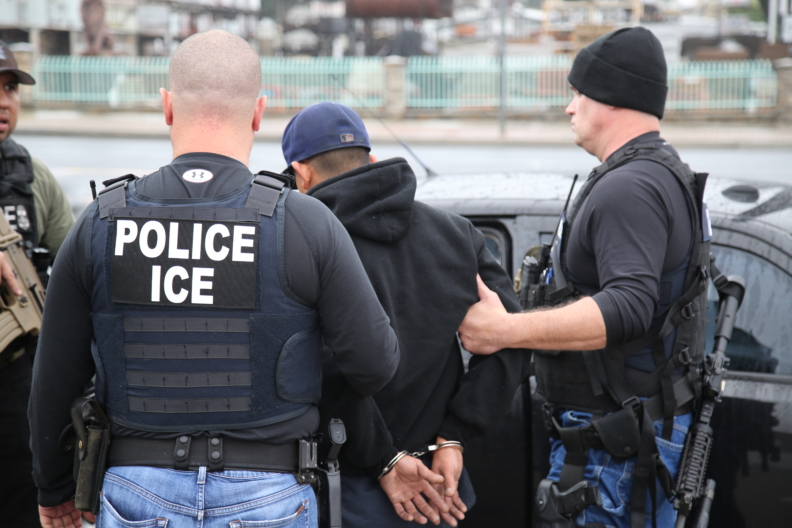When I took family vacations as a child—long before GPS—I always volunteered to serve as the navigator, guided by our gas station maps.
Most markings on the maps indicated something visible: roads, railroads, rivers, lakes and towns. But one thing very prominent on the maps was invisible to the eye: the borders that indicated city limits, county lines, state boundaries and national borders. A sign might say that we had moved into new territory, but there was no dashed or colored line on the ground as was on the map.

An old proverb says, “When the map and the terrain differ, the terrain is always right.”
The map says there’s a boundary in certain places, but the terrain recognizes no such thing. God did not create the world with boundary lines. They are something we humans superimposed on it all in an effort to protect and organize ourselves. God’s world has no borders.
Yes, I know about Deuteronomy 32:8. “When the High God gave the nations their stake, gave them their place on Earth, he put each of the peoples within boundaries under the care of divine guardians. But God himself took charge of his people, took Jacob on as his personal concern.” But this verse is not saying that all national boundaries are divinely given and can never be changed. And of course, that hasn’t happened. Rather, it declares that when God assigned supernatural powers to oversee various people groups, the Lord gladly assigned himself to watch over Israel.
Later God promised Abraham a land with borders from the river of Egypt to the Euphrates (Genesis 15:18-21). God also gave detailed boundaries for the twelve tribes of Israel in the books of Joshua and Ezekiel. Initially God commanded Israel to rid the land within these borders of certain Canaanite groups. That, however, is not a general command for other times or places. For a more lasting and general command, check out Leviticus 19:34, “You shall treat the stranger who sojourns with you as the native among you, and you shall love him as yourself.”
Now that Jesus has come, the people of God have no need themselves to maintain national borders. The nations may still think we need them, and will kill a lot of people, spend a lot of money, and cause a lot of misery to maintain or expand those borders. But the people of God live and move everywhere and are called to love everyone–even those who cross borders.

So why are so many Christians today are so riled up about undocumented aliens? Maintaining boundaries to keep others out is human rule, not a God-ordained command. Unlike stealing and killing (which are inherently evil), moving from one area of the world to another is not inherently evil. Jacob moved his family to Egypt in order to find food during a famine. Joseph and Mary brought baby Jesus to Egypt to escape a hostile king. I’m sure these people of faith were glad that there was no Egyptian ICE to return them to Canaan.
So many Christians in the US speak as if violating immigration laws is one of the worst of all possible sins. Of course, God gives us a general rule to obey the government, but human laws about procedures are not nearly as important as God-given commands about morality. I know that there are those who claim”when these undocumented people cross the border, they steal our goods, take away our jobs, rape and kill our family members, and drain our government of resources.” But studies I’ve seen indicate that undocumented people as a whole make good neighbors, obey the law, often work at jobs other Americans don’t want, reduce crime rates and make positive contributions to society.
Moreover, many of these same outraged Christians are just as guilty of violating other human laws. We speed on the roads causing far more deaths in the US than murders committed by undocumented aliens. But we keep speeding anyway. We fudge numbers in order to save on taxes. We set off fireworks illegally that cause fires, and maim, even kill people.

And why do we break human rules? Undocumented people usually do it out of a desperate need to escape oppression and persecution and to provide for their vulnerable children. But documented people do it to save a few minutes driving, to have some extra money or, ironically enough, to go “ooh-aah” in celebrating a nation of laws. Compared to what motivates undocumented people, our reasons for breaking human rules are pretty paltry. If there’s to be moral outrage, it should be directed at us. Imagine if the government cracked down on speeders in the same way that it cracks down on undocumented people—perhaps confiscating our cars if we drove two miles over the limit?
Jesus criticized the Pharisees with these words, “Woe to you, scribes and Pharisees, hypocrites! For you tithe mint and dill and cumin, and have neglected the weightier matters of the law: justice and mercy and faithfulness” (Matthew 23:24). American Christians are doing the same thing. We get irate over people breaking human rules (even deporting undocumented people because a headlight was burned out), but we ignore basic moral issues like justice for the oppressed, mercy for desperate people who come to our land, and faithful compassion for those in need, even those who don’t or can’t follow governmental procedures.
I realize that having totally open borders is a formula for chaos. Legislators need to make difficult choices with limited resources. I’m sure it’s hard to know what to do. But we Christians can certainly do a better job of remembering God’s call to love strangers as ourselves. Why then such enthusiasm for blocking or deporting desperate people?
We serve a God without borders in a world created without borders.
Header photo by Ioann-Mark Kuznietsov on Unsplash
Arid hills photo by David Dvořáček on Unsplash


16 Responses
Exactly.
I wonder if it might have something to do with our unique American exclusivist ideas about private property, which has lost any legal sense of the “common” good.
Something to think about, huh? The ‘American dream’ that I (and many of us) grew up with was to someday own your own home and along with that the land it sits on. Which leads to the first boundaries drawn on the survey we are given at closing. Then of course, we need to treat our land well, cultivate it, and protect it – which often leads to fences and security systems in today’s world. That seems like a fixed paradigm today. So how do we expand our thinking to exist in our current reality of perceived ownership and also exist in the world God created and loves without boundaries?
Another passage about this is Isa 19:23-29 which talks about a highway from Egypt to Assyria so that the Assyrians will go to Egypt and the Egyptians go to Assyria. Then they can worship together along with Israel so all three nations can be a blessing on the earth, all all three are God’s people. IT was never just about Israel then and it is never just about America now. God cares for ALL nations!
Fifteen years ago I was on a CRCNA Study Committee on this very issue. I was the principal author of part VII on the biblical and theological materials pertinent to immigration. Once I dug into Scripture on this issue, it was startling to see it is a Bible-wide theme and that it sounds one very consistent note: be kind to the alien within your gates.
https://www.crcna.org/sites/default/files/Migration.pdf
Did synod adopt ( or affirm) these recommendations beginning on pg 31 of this report?
Yes, yes, yes!
Thank you for this.
So good! Thank you!
AMEN.
Yes, thank you! And it makes me wonder how many of our Christian pulpits today boldly proclaim this biblical theme – welcome the alien among you, for they too are your neighbor to love.
Amen and Amen.
I appreciate this insightful piece, David. Reading it tweaked my memory of several troubling border crossings Judy and I experienced in Port Huron, Michigan as we traveled from our home in Ontario to Grand Rapids.
Hmm, there’s a blog there too. 🙂
Being kind to the “alien within your gates” carries with it the reminder that “you yourselves were once aliens”! Every one of us, including Abraham, was once an alien. But…. now that we have secured our space, let’s secure the borders. And let’s embrace convenient lies so we can maintain a campaign platform. Partisan/patriotic platforms do not trump (sorry) Christian principles. I do not ask pastors to preach this and sacrifice their careers, but I do ask each of us to challenge the lies at every opportunity.
I believe I heard this from James Allison, comparing the biblical creation stories with the Roman. In both a brother kills another brother. In the Roman account, Romulus kills Remus, but before that Romulus builds a wall around “his turf” and also, I believe plows that land, again indicating a border of what is his. It’s when Remus mocks and disregards the border that Romulus kills him. It is a story that makes boundaries holy and from old, a sense of this property being “mine.” In contrast, after Cain has killed Abel, and then replies to God’s inquiry about Abel, “Am I my brother’s keeper?” the entire rest of the book is basically a long answer of “Yes!” So in one story, we are our sibling’s keeper. In the other, there is a sense of “this is mine” and the boundaries are fixed and forever. Probably shouldn’t surprise us that today’s America is more informed by Roman stories than biblical stories.
Excellent! I was not aware of the details of the Romulus and Remus story. When you said the entire rest of the book is basically a long answer of yes, I wasn’t sure if you meant Genesis (Cain in contrast with Joseph) or the whole Bible (Cain in contrast with Jesus) as the rest of the book. In either case, the answer would be yes.
There’s a difference between having open borders – welcoming new people in – and not having borders. Not having borders would mean there would be no definition to where our government and our laws have jurisdiction – including the laws to protect vulnerable people.
Fantastic article. Couldn’t agree more.